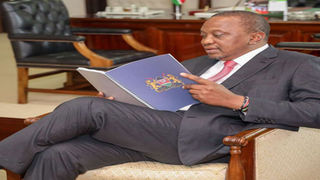
President Uhuru Kenyatta reads the Building Bridges Initiative report after receiving it at State House in Nairobi on November 26, 2019.
| PSCUNews
Premium
I was condemned unheard, Uhuru tells appeal court judges
What you need to know:
- President argues that the Constitution does not bar him from using the popular initiative to drive constitutional amendments.
- Through a team of three lawyers, the President says the High Court judgment has implication of limiting his right to participate in political processes.
President Uhuru Kenyatta says the High Court infringed and limited his individual rights when it denied him an opportunity to be heard in the petitions relating to the Building Bridges Initiative (BBI).
The President says the High Court also erred by declaring that he had violated the Constitution for proposing and promoting amendment of the Constitution through the BBI task force, which was declared an illegal entity, instead of using the parliamentary route.
In his partial appeal where he is fighting the declarations of the High Court that are adverse to him personally, the President argues that the Constitution does not bar him from using the popular initiative to drive constitutional amendments.
Through a team of three lawyers led by Waweru Gatonye, Mohammed Nyaoga and Kiragu Kimani, the President says the High Court judgment has implication of limiting his right to participate in political processes.
"Nobody has directed the court to a provision in the Constitution that bars the President from using popular initiative or says he can only use Parliament. No provision bars the President from initiating an amendment of the Constitution through a popular initiative," said the lawyers yesterday during the second day of hearing of appeals against the High Court decision that blocked a plan to change the Constitution. The session was later in the evening disrupted by a power blackout.
The lawyers urged the appellate court to set aside a declaration by the High Court that the President does not have authority under the Constitution to initiate changes to the Constitution, and that a constitutional amendment can only be initiated by the President through the Attorney General in Parliament through a parliamentary initiative.
The seven-judge bench of the appellate court heard that the trial court made a fundamental error by making adverse declarations and orders against the President without finding out whether he had been furnished with the petition in which he had been sued in his private capacity.
Mr Gatonye said the President had been made a party by one of the petitioners, Isaac Aluoch Polo Aluochier, and the trial court condemned him unheard.
Right of fair trial and hearing
"When a person has been sued, he is entitled to be notified and served with the documents on allegations made against him. In this case a petitioner sued the President in his private capacity and failed to serve him. The court proceeded to hear the matter and made orders against him," said Mr Gatonye.
While emphasising that President Kenyatta is entitled to the right of a fair trial and fair hearing, the lawyer said the breach of rights in litigation is so serious that the resultant orders are a nullity.
Mr Gatonye stated that without service of document, it does not matter, in litigation, whether there is evidence of the allegations or not. He said failure to serve documents is a serious omission in litigation.
The lawyer said the Attorney General had objected to suing of the President at the High Court, but his protest was futile.
Further, he added that the trial court had initially ruled that the Attorney General was representing the President in the case, only for the judges in their judgment to declare that the President should have responded to the petition in person or through a private lawyer.
Mr Gatonye urged the court to set aside the order and declarations adverse to the President, arising from the BBI dispute.
Lawyer Nyaoga said unless the declarations made against their client are annulled, he (the President) will face civil cases that will distract him in performance of his duties.
Criminal proceedings
The lawyer said the trial court made an erroneous finding that civil proceedings can be opened against the President in his personal capacity.
"The President is immune to civil and criminal proceedings during his tenure of office in respect of anything done or not done in exercise of his powers. The holding of the trial court was without a constitutional basis," said Mr Nyaoga.
However, the argument on President's immunity to legal proceedings attracted questions from the judges on what happens to disputes arising from President's personal engagements such as private contracts, businesses or social disputes.
Since the Constitution says the President cannot be sued for exercising his constitutional powers, the court posed a question to the lawyer on what happens when he (President) acts outside constitutional powers.
Lawyer Nyaoga maintained that the President cannot be sued at all and that even if he misconducts himself, there are other mechanisms of addressing the disputes.
He urged court to set aside High Court's declaration that civil court proceedings can be instituted against the President or a person performing the functions of the office of President during their tenure of office in respect of anything done or not done contrary to the Constitution.
Mr Kimani argued that their client is entitled to protection of the law, service (of court documents) and invitation to defend himself.
He stated that the President can take any position he wishes on the Constitution and he can be involved in the process of amending it.





